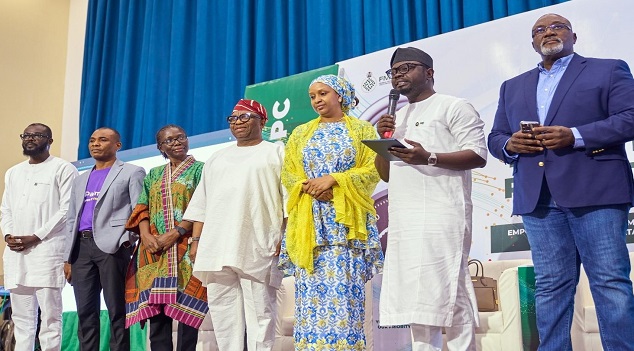News
Nigeria Runs to India for Co-WIN App to Drive COVID-19 Vaccination

Nigeria is reportedly among 50 countries that have shown interest in having a Co-WIN like system to run their vaccination drive and India has promised to share the open source software free of cost.

Co-WIN application is the digital back bone for the vaccination drive in India.
Dr R S Sharma, chairman of the empowered group for COVID-19 vaccine administration, said Indian Prime Minister Narendra Modi has directed officials to create an open source version of the platform and give it free of cost to any country that wants it, news agency PTI reported..
“The Cowin platform has become so popular that as many as 50 countries from central Asia, Latin America, Africa all showed interest in having a Co-win like system,” Sharma said at the second Public Health Summit 2021 on ‘Emerging Imperatives in Strengthening Public Health for India’ organised by Confederation of Indian Industry.
He also said a virtual global conclave of health and technology experts from across the world will be held on July 5 where India will share how this system works.
“We are telling the world how this system can work and how we are ready to share an open source software with any country free of cost.
There have been huge interests starting from Canada, Mexico, Panama, Peru, Azerbaijan, Ukraine, Nigeria, Uganda,” he said.

Sources said other countries such as Vietnam, Iraq, Dominican Republic, the United Arab Emirates have also expressed interest in knowing about the Co-WIN platform for implementing it in their own countries to run their own COVID programmes.
In five months, Sharma said, Co-WIN has grown to handling 30 crore plus registrations and vaccinations.
“It is a citizen-centric platform and provides a single source of truth till the district level. From the beginning, it was ensured that the platform can be easily used to schedule, reschedule and cancel appointments,” he said.
Sharma also said that vaccinating 1.3 billion people is not a “trivial task”, and added that the development of a Cowin-like platform shows India has the capability to develop such great scalable digital systems.
“Most importantly you can go without any appointment to vaccination centre and get vaccinated. In fact, 80 per cent of our people have gone to the centre without any appointment,” he added.
On the National Digital Health Mission (NDHM), Sharma said the whole idea is based on the concept that many services can be digitally delivered.
The NDHM will house all kinds of databases which will have a facility for the patient to fetch his/her records, he said.
“One of the silver linings of the Corona period is that we are at ease with digital consultation. The most important outcome of this is going to be generation of data for researchers and academic,” Sharma said.
India has created digital artefacts such as Aadhar that will enable the delivery of services digitally, he said.
One such digital product created is e-voucher which is person and purpose-specific and will be launched very soon, he said.
Delhi AIIMS Director Dr Randeep Guleria told the event that the pandemic has disrupted the healthcare ecosystem and public health infrastructure and has challenged resilience.
“Now we need to look ahead and strengthen our public health system. We need to be prepared for such a pandemic in future. Our basic aim is to have equitable access in remote areas. Important to look at health as a percentage GDP and we should look at 2.5% of healthcare expenditure. Health is a state subject but currently there is a lack of co-ordination among states,” he said.
Some challenges that need to be met are underinvestment as far as healthcare is concerned. Secondly, public health system should be driven by tech and data, he said.
There is a need to provide tele-health and tele-diagnostics in rural parts of India and industry has an important role to play. Also there is a need for a robust electronic healthcare system, Dr Guleria said.
News
PalmPay Partners FG to Drive Data Protection Awareness

PalmPay reinforced its commitment to data protection and youth empowerment with a ground-breaking partnership with the Federal Ministry of Youth Development to launch the Youth Data Protection Awareness and Training (YDPAT) Program, which is targeted at equipping over 1,000,000 Nigerian youths digitally over 3 years.

The training program, commissioned last week at the Shehu Musa Yar’ Adua Centre in Abuja, will focus on providing youths with the right knowledge and skills required to navigate the digital landscape safely. With over 70% of the Nigerian population consisting of youths, this is an important move to foster trust, security and youth-focused innovation.
Speaking at the launch, the Honourable Minister of Youth Development, Comrade Ayodele Olawande, commended PalmPay’s partnership in the actualisation of the program and described YDPAT as a bold step toward building a digitally literate and security-conscious generation.
In his words, “This is about building a privacy-first generation, one that is inclusive, future-facing, and globally competitive.” He also emphasised the low awareness of the Nigerian Data Protection Act (NDPA), 2023 and the critical shortage of certified Data Protection Officers (DPOs), despite over 500,000 data controllers operating in the country.
This position was equally supported by PalmPay’s Managing Director, Mr Chika Nwosu, who stated how data protection is as important as innovation in tech. He noted that PalmPay integrates privacy into every stage of its product development, ensuring that user information is safe.
Beyond ensuring data protection, PalmPay is committed to empowering young Nigerians with real opportunities for growth, with mentorship and internship placements for top-performing participants. It has led several youth-oriented initiatives, including the Purple Woman campaign, and Passing the Baton CSR for thousands of youths and women in urban and rural communities.
With a drive to achieve nationwide digital literacy, PalmPay is championing campaigns in Northern Nigeria, with more activations planned across various states.
News
FG to Move 5m Homes to Clean Cooking by 2030 — Minister

Ekperikpe Ekpo, minister for State, Petroleum Resources (Gas), said it is working towards a renewed target of moving about five million homes to clean cooking by 2030.

Ekpo, made the declaration while delivering the ministerial address and remarks on Monday at the opening ceremony of the 48th Nigeria Annual International Conference & Exhibition (NAICE) 2025.
This year’s conference is themed ‘Building a Sustainable Energy Future: Leveraging Technology, Supply Chain, Human Resources, and Policy.’
He explained that the target can only be made possible through increased investment in gas infrastructure in critical projects such as the OB3 and AKK pipelines, progressing to deliver gas to markets nationwide; and promoting modular and scalable gas projects, including mini-LNG and CNG stations.
According to him, the government is also ramping up efforts to improve last-mile access and stimulate local economic activity and facilitate job creation through strategic public-private partnerships in the construction, logistics, and retail segments of the gas value chain.
“His Excellency, President Bola Ahmed Tinubu, GCFR, has placed gas at the heart of Nigeria’s energy strategy. His vision, aptly captured in the phrase “From Gas to Prosperity”, reflects our national ambition to utilise our abundant natural gas resources to fuel industrialisation, create jobs, and expand access to clean and affordable energy for all Nigerians.
“Over the past year, we have taken decisive steps in line with this vision. We have expanded gas supply for industrial use, prioritising gas availability for manufacturing hubs, power generation, and industrial corridors. As of today, I’ve been reassured that every gas offtaker currently receives the gas they require for their industrial processes; Rolled out the LPG Penetration Programme, distributing cylinders across the six geopolitical zones and empowering women and youth, promoting clean cooking.
“Under the Decade of Gas Initiative, we are also making meaningful strides to unlock value across the midstream and downstream sectors.
“Notably, we have facilitated the development of gas processing facilities and virtual pipeline systems, ensuring gas reaches off-grid and underserved communities, supported private sector investment in LPG and CNG infrastructure, including autogas stations, domestic cylinder manufacturing, and distribution networks, strengthened coordination via the Decade of Gas Secretariat, driving alignment and accountability across Ministries, Departments, and Agencies, Advanced the Nigerian Gas Flare Commercialisation Programme (NGFCP), converting waste to wealth while supporting environmental goals, secured presidential approvals to address legacy debts, incentivising upstream gas supply and stabilising the domestic market”, he said.
He also said the federal government has released much-needed financial support to project promoters via the Midstream Downstream Gas Infrastructure Fund (MDGIF).
“All these efforts are anchored on a single, resolute belief, which is that Nigeria’s gas must work for Nigerians, not just as an export commodity, but as a foundation for inclusive growth, national development, and energy security.”
Speaking on the four pillars highlighted in the conference theme – technology, supply chain, human resources, and policy –- the Minister noted that each plays a vital role in shaping Nigeria’s energy future.
On technology, he said the adoption of digital solutions, automation, and data-driven tools across the gas value chain is essential.
“From reservoir monitoring to distribution analytics, emerging technologies can enhance efficiency, reduce emissions, and optimise delivery. The Ministry continues to collaborate with industry players to foster digital innovation,” he said.
He explained that a strong local supply chain is essential to sustaining the gas economy.
“Through the Nigerian Content Development and Monitoring Board (NCDMB), we are driving localisation of equipment manufacturing, pipe production, and other critical components to reduce import dependence and build national resilience.
“Our human capital remains our greatest asset. We are committed to nurturing a technically sound, diverse, and future-ready workforce through continuous training, strategic academic-industry partnerships, and deliberate youth and gender inclusion policies in the gas space.
“The Petroleum Industry Act (PIA) has provided a solid regulatory and fiscal foundation. We are implementing market-reflective gas pricing frameworks, encouraging deepwater gas development, and enforcing domestic supply obligations to drive investor confidence and sector expansion,” he noted.
News
Experts Caution e-commerce Operators on Eco-friendly Materials

Experts have urged the Nigerian e-commerce industry to use eco-friendly materials in its packaging and logistics of products to reduce carbon emissions and protect the environment.

The experts made this known at a sensitisation workshop on Greening E-commerce orgainsed by The Sustainable and Inclusive Economic Development for Decent Employment In Nigeria Programme (SEDIN) – an initiative of the German Development Agency (GIZ) in partnership with Nigerian Postal Services (NIPOST).
The experts stressed the importance of e-commerce operators in Nigeria committing to concrete climate actions and sustainable operations.
Nnaemeka Ngwu, director of the public sector initiative and a professor at Lagos Business School, urged e-commerce companies to quickly adopt sustainable green technology to minimize their environmental harm.
“E-commerce is a business enabler and a platform through which many people can get involved in trade and commerce. However, e-commerce also brings lots of issues in sustainability and climate change because of pollution,” he said.
According to him, to improve the sustainability component of e-commerce, the country must promote better packaging and logistics among operators.
“We need to green the e-commerce industry to make it more inclusive and support the climate so that it does not cause risks and issues,” he explained.
He commended the Lagos State government on the ban on single-use plastics, calling for the policy to be complemented with awareness, advocacy, and engagement so that the public understands the reason for the policy.
He noted that such awareness should be done regularly, while urging the Nigerian Postal Service to use its leadership role in the courier industry to engage other courier businesses within the space on the benefits of sustainability and the packaging and logistics issues.
In her opening remarks, Titi Oshodi, special adviser to the Lagos State Governor on Climate Change and Circular Economy, called for awareness on greening across various sectors of governance, communities and the private sector
“This will ensure that people understand the rationale behind the policies on greening and they also understand what the alternatives are,” she noted.
“This is the reason why climate literacy is a front-boner strategy for us in Lagos State,” she added.
She explained that Lagos is a commercial hub that grew its GDP due to the operations of micro, small and medium-size businesses. “We need to have them empowered, more knowledgeable about sustainability practices.”
Tola Odeyemi, postmaster-general, Nigerian Postal Services (NIPOST), said the courier can play a strategic and vital role in greening the ecosystem, noting that it has 1,174 post offices nationwide.
Odeyemi, who was represented by Ernest Mamood, general-manager of EMS Parcel Nigeria, said NIPOST is a regulator in the country’s courier industry and can use its position to sensitize other operators in the industry on the use of eco-friendly materials in packaging and logistics to cut environmental impact.

 General News3 days ago
General News3 days agoNOA Warns of Fake N1000 Notes in Circulation, How to Identify Them

 Telecom3 days ago
Telecom3 days agoMTN @ First-ever CED, Pledges to Address Subscribers’ Concerns

 E-Financial3 days ago
E-Financial3 days agoWest Africa Emerging as Crypto Adoption Epicentre- SEC Boss

 Telecom2 days ago
Telecom2 days agoNCC to Sanction Operators over Regulatory Violations

 General News3 days ago
General News3 days agoNCC, IHS Towers Lead Others To NITRA-ALTON CNII & Telecom Sustainability Conference 2025

 Telecom3 days ago
Telecom3 days agoAirtel Nigeria Raises Infrastructure Spending to $39m

 General News2 days ago
General News2 days agoCustoms Ditches Fast Track Scheme for Authorised Economic Operator

 Broadcasting3 days ago
Broadcasting3 days agoGovernment of Ghana Slams MultiChoice, Insists on DStv Price Cut



























